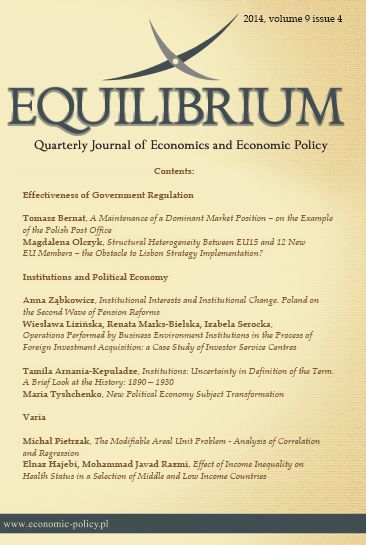Alternative Views on Money in the First Half of the XX Century and Today
DOI:
https://doi.org/10.12775/EQUIL.2014.030Keywords:
money, fractional reserve, full-reserve banking, seigniorage, demurrageAbstract
The paper deals with the discussion on the alternative ideas on money, created by Silvio Gesell, Frederic Soddy and Karl Ballod. Particularly, the ideas of full-reserve banking, privilege of seigniorage and the principle of demurrage are discussed in the context of possible implementation of these ideas in a future economy. Large part of the paper is library-based, considering and briefly explaining the previously mentioned ideas, and supplementing them with the opinions of the modern economists. The discussion of the possible evolutionary way to implement those ideas is based on the logical analysis and conclusions, derived from the discussions of the author with academicians and financiers. The results lead to the conclusion that these ideas, which may seem unrealistic according the existing paradigm of growth, may turn out to be useful to form the basis of a new monetary and financial system within the new economic paradigm. The paper is an insight into unorthodox proposals on money, which may be useful to specialists and students, investigating monetary and financial systems.
Downloads
References
Balodis, K. (1931), Latvijas saimniec?ba pie sp?j?gas un pie nesp?j?gas vald?bas. Riga.
Bhagwati, J. (2008). We need to guard against destructive creation. Financial Times. October 16.
Chang, H. J. (2010), 23 Things They Don?t Tell You about Capitalism. London: Penguine Books Ltd.
Daly, H.E. (1996). Beyond growth: the economics of sustainable development. Boston: Beacon Press.
Daly, H. E., Farley, J. (2011). Ecological economics: principles and applications. Washington, Covelo-London: Island Press.
Gesell, S. (1958). The Natural Economic Order. London: Peter Owen Ltd.
Kennedy, M. (1995). Interest and Inflation Free Money. Creating an Exchange Medium that Works for Everybody and Protects the Earth. Retrieved from http://kennedy-bibliothek.info/data/bibo/media/GeldbuchEnglisch.pdf (17.06.2014).
Keynes, J. M. (1930). Economic Possibilities for our Grandchildren In: D. Moggeridge (Ed.). The Collected Writings of John Maynard Keynes. Vol. IX. London: Macmillan, 1972.
Sarkozy, N. (2010). Speech in 40th World Economic Forum, Davos, January 27, 2010. Retrieved from www.polity.org.za/article/fr-sarkozy-speech-by-the-president-of-france-at-the-40th-world-economic-forum-davos-27012020-2010-01-27 (22.05.2010).
Soddy, F. (1934). The Role of Money. London: George Routledge and Sons Ltd.
Tobin, J. (1965). Money and Economic Growth. Econometrica, 33(4).






